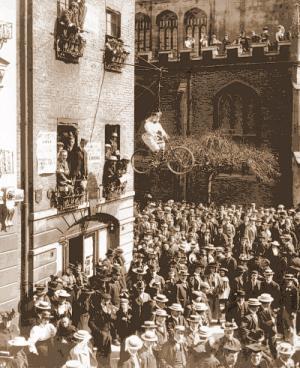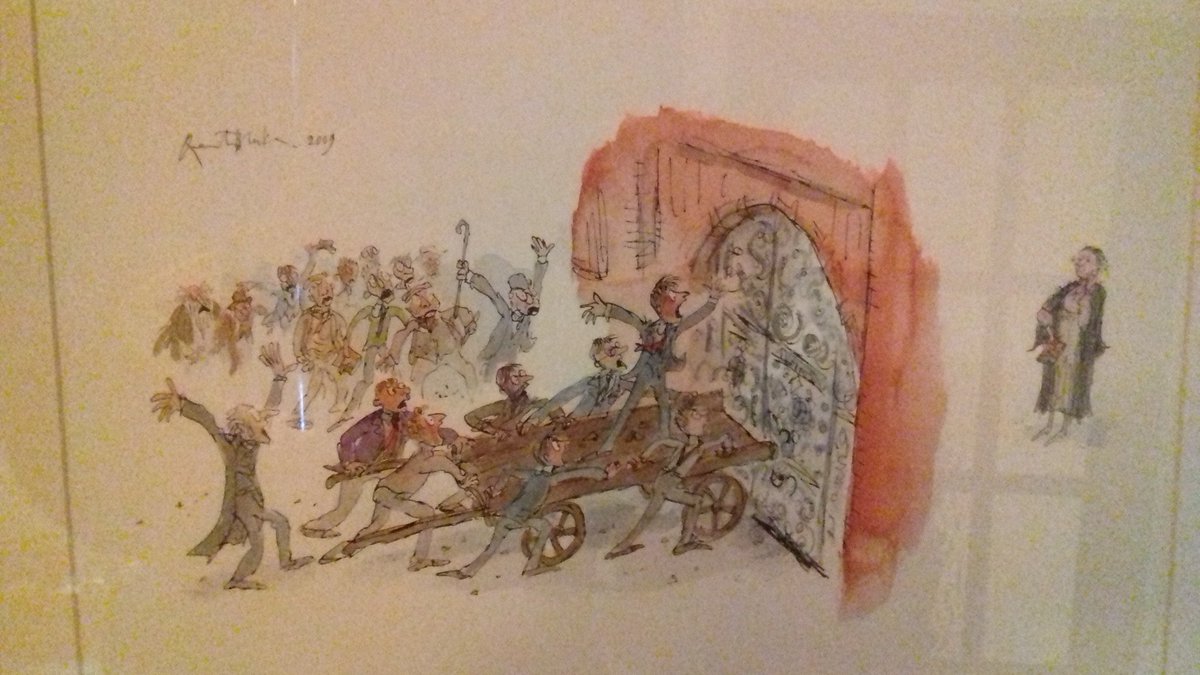So, at @ancientlyric's request... a thread on Women, Degrees and Cambridge.
Did you know women were not awarded full Cambridge degrees until 1948? No just the PhD, but the BA as well! This picture illustrates one stage in that story. Read on, dear Tweeter... https://twitter.com/ancientlyric/status/1281853414297571328
Did you know women were not awarded full Cambridge degrees until 1948? No just the PhD, but the BA as well! This picture illustrates one stage in that story. Read on, dear Tweeter... https://twitter.com/ancientlyric/status/1281853414297571328
I want to rewind us to 1881, which is a milestone of its own; this is the year of the so-called Three Graces which allowed women who were at Cambridge to formally sit University exams. Although women had been attending lectures since 1871, exams had been marked...
...by private arrangement with the examiner. So if you had someone sympathetic to women's education, you were fine, but if not... and of course, none of the marks had any formal standing. The university legislation of 1881 changed that, so women could formally sit the exams.
Of course, even if they could sit the exams, the *marks* didn't mean anything... but it's the first step to formal recognition. That this might be a silly state of affairs is recognised in 1897, when a proposal is made to grant degrees to women.
Just how this went down is clear from the effigy of a woman on a bicycle suspended by male undergraduates in response to the proposal. I think it is fair to say they were not supportive. The proposal got nowhere.
Zoom forward to 1921. Let's note that since the Three Graces, women have been sitting University exams, having their marks awarded in separate class tables to the men, and not getting to claim the same degree on their CV.
This does lead again to some nonsenses, like 1890, when Philippa Fawcett beat the Senior Wrangler (highest scoring mathematician), but this is not clear because the men's and women's results tables are separate... more about Fawcett at http://www.diverse.cam.ac.uk/stories/fawcett/
Back to 1921! Another proposal to give women degrees goes in front of Senate House, Cambridge's governing body. Not, you would think, contentious - Oxford passed a similar proposal in 1920 with minimal fuss.
But you would have reckoned without... the MAs.
But you would have reckoned without... the MAs.
Sidenote: one of the weirdnesses of the Cambridge system which still persists is that if you have done a BA at Cambridge, after nine more terms you're automatically entitled to an MA. Without any studying. Which is why I have a Cambridge MPhil (which I did study for!).
It's also why people listing qualifications give their degree as MA (Cantab), to indicate it's an honorary qualification. Providing you know how to decipher that, of course, which is another thread altogether.
In 1921, everyone with an MA had a vote at Senate House discussions.
In 1921, everyone with an MA had a vote at Senate House discussions.
Normally, only those MAs living in Cambridge would bother turning up, if then. Votes for women, though, meant a lot more Men had Views. Many of them seemed to be vicars who had done their theological training at Cambridge and now wished to Express Their Views.
There were so many of them, in fact, that on the day of the vote, the train companies had to lay on special trains to get all the MAs who had Views to Cambridge in order to express them.
You can imagine what the centre of town was like.
You can imagine what the centre of town was like.
With such concerted opposition, it's no surprise that the proposal did not pass.
What happened next was perhaps unsurprising in the febrile atmosphere. Someone (I believe an anonymous clergyman) stood up in front of the undergraduates and whipped them up into a frenzy.
What happened next was perhaps unsurprising in the febrile atmosphere. Someone (I believe an anonymous clergyman) stood up in front of the undergraduates and whipped them up into a frenzy.
Having been charged with putting down the rebellious bluestockings once and for all, a mob of male undergraduates headed off to @Newnham_College.
The alternative, Girton, would have been a couple of miles up-hill, so one can see why a jaunt over the river was more appealing.
The alternative, Girton, would have been a couple of miles up-hill, so one can see why a jaunt over the river was more appealing.
The timing was particularly ironic. @Newnham_College had just celebrated its fiftieth anniversary a fortnight before, welcoming back as many alumnae as it could, with the University Chancellor (Arthur Balfour) in attendance.
The Principal of Newnham at the time was Blanche Athena Clough.
Thena had a good pedigree. Her aunt, Anne Jemima Clough, had been Newnham's first Principal, and Thena had been a student there. While she had not been a particularly distinguished classicist, she was...
Thena had a good pedigree. Her aunt, Anne Jemima Clough, had been Newnham's first Principal, and Thena had been a student there. While she had not been a particularly distinguished classicist, she was...
...a very competent university administrator, which shows in the way she held the college together during this turbulent period.
But on this day in 1921, she does something extraordinary.
But on this day in 1921, she does something extraordinary.
She stands behind the Clough gates, closed against the angry throng, who are whipped up into such a frenzy that they ram-raid the gates with a coal trolley, doing the memorial metalwork serious damage.
She stands. And watches.
She stands. And watches.
Eventually, the riot quiets down and the undergraduates slope off. Over the following weeks, various letters of apology are written by various student societies. Collections for the repair of the gates, a memorial to Anne Jemima Clough, are taken. The gates are repaired.
The defeat of the proposal to give women degrees stands. There's a sop offered - women are given diplomas which "conferred the Title of the Degree of Bachelor of Arts" - but they do not *admit* women to the degree, so it doesn't count.
(Some women at Cambridge had got around this earlier by becoming what was called a Steamboat Lady and getting a degree from Trinity College Dublin via reciprocal arrangement - but this was a loophole swiftly closed. See https://en.wikipedia.org/wiki/Steamboat_ladies for more.)
The end of the story, I'm afraid, is rather anti-climactic. The motion to award women full degrees passed quietly and without much fuss in 1948. I seem to remember there was one token objection in the debate, and possibly not even that.
By this point, women have been appointed to University teaching posts (since 1926), given the vote from 21 (1928) and elected as Professors (1939, Dorothy Garrod of Newnham, who becomes Professor of Archaeology).
So you could be a Professor at Cambridge *and still not have a Cambridge degree*.
One suspects that the reason this was all handled quite quietly may have been a reasonable dose of embarrassment. I hope so, anyway.
So that's the story of how women got admitted to full degrees at Cambridge.
If you've enjoyed this thread, you might also enjoy my chapter on women classicists at Newnham from 1882-1922, which is available at https://books.google.co.uk/books?id=pOYoDQAAQBAJ&lpg=PA1&dq=Women%20Classical%20Scholars&pg=PT171#v=onepage&q&f=false
Thanks for reading!
If you've enjoyed this thread, you might also enjoy my chapter on women classicists at Newnham from 1882-1922, which is available at https://books.google.co.uk/books?id=pOYoDQAAQBAJ&lpg=PA1&dq=Women%20Classical%20Scholars&pg=PT171#v=onepage&q&f=false
Thanks for reading!

 Read on Twitter
Read on Twitter



